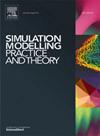An iterative surrogate-based optimization approach for multi-server queuing system design
IF 3.5
2区 计算机科学
Q2 COMPUTER SCIENCE, INTERDISCIPLINARY APPLICATIONS
引用次数: 0
Abstract
Queuing systems play an important role in numerous domains, including banks, supermarkets, traffic control, call centers, and production processes. Traditional methods for designing multi-server queuing systems often rely on trial-and-error or extensive simulations, making them time-consuming and computationally expensive. This paper addresses these challenges using MEVO (Metamodel-based Evolutionary Optimizer), a surrogate-based optimization algorithm. MEVO employs a machine-learning model as a surrogate model, reducing reliance on computationally intensive simulations. The algorithm also integrates evolutionary operators for efficient solution space exploration, a long-term memory strategy to avoid redundant simulations, and a dynamic search space reduction mechanism to enhance optimization efficiency.
A case study of a supermarket checkout system, modeled in FlexSim, demonstrates the algorithm’s efficacy in optimizing queuing configurations under stochastic variables such as customer arrival rates, basket sizes, and transaction values. MEVO achieves solution-quality performance comparable to the FlexSim optimizer while significantly reducing computation times. MEVO also delivers comparable computational performance to Bayesian optimization while exhibiting lower variance in objective-function results than FlexSim, highlighting its consistency and robustness.
基于迭代代理的多服务器排队系统优化设计方法
排队系统在许多领域发挥着重要作用,包括银行、超市、交通控制、呼叫中心和生产过程。设计多服务器排队系统的传统方法通常依赖于试错或大量模拟,这使得它们非常耗时且计算成本很高。本文使用MEVO(基于元模型的进化优化器),一种基于代理的优化算法来解决这些挑战。MEVO采用机器学习模型作为替代模型,减少了对计算密集型模拟的依赖。该算法还集成了进化算子以实现高效的解空间探索,长期记忆策略以避免冗余模拟,动态搜索空间缩减机制以提高优化效率。在FlexSim中建模的超市结账系统的案例研究表明,该算法在随机变量(如顾客到达率、购物篮大小和交易价值)下优化排队配置的有效性。MEVO实现了与FlexSim优化器相当的解决方案质量性能,同时显着减少了计算时间。MEVO还提供了与贝叶斯优化相当的计算性能,同时在目标函数结果中表现出比FlexSim更低的方差,突出了其一致性和鲁棒性。
本文章由计算机程序翻译,如有差异,请以英文原文为准。
求助全文
约1分钟内获得全文
求助全文
来源期刊

Simulation Modelling Practice and Theory
工程技术-计算机:跨学科应用
CiteScore
9.80
自引率
4.80%
发文量
142
审稿时长
21 days
期刊介绍:
The journal Simulation Modelling Practice and Theory provides a forum for original, high-quality papers dealing with any aspect of systems simulation and modelling.
The journal aims at being a reference and a powerful tool to all those professionally active and/or interested in the methods and applications of simulation. Submitted papers will be peer reviewed and must significantly contribute to modelling and simulation in general or use modelling and simulation in application areas.
Paper submission is solicited on:
• theoretical aspects of modelling and simulation including formal modelling, model-checking, random number generators, sensitivity analysis, variance reduction techniques, experimental design, meta-modelling, methods and algorithms for validation and verification, selection and comparison procedures etc.;
• methodology and application of modelling and simulation in any area, including computer systems, networks, real-time and embedded systems, mobile and intelligent agents, manufacturing and transportation systems, management, engineering, biomedical engineering, economics, ecology and environment, education, transaction handling, etc.;
• simulation languages and environments including those, specific to distributed computing, grid computing, high performance computers or computer networks, etc.;
• distributed and real-time simulation, simulation interoperability;
• tools for high performance computing simulation, including dedicated architectures and parallel computing.
 求助内容:
求助内容: 应助结果提醒方式:
应助结果提醒方式:


